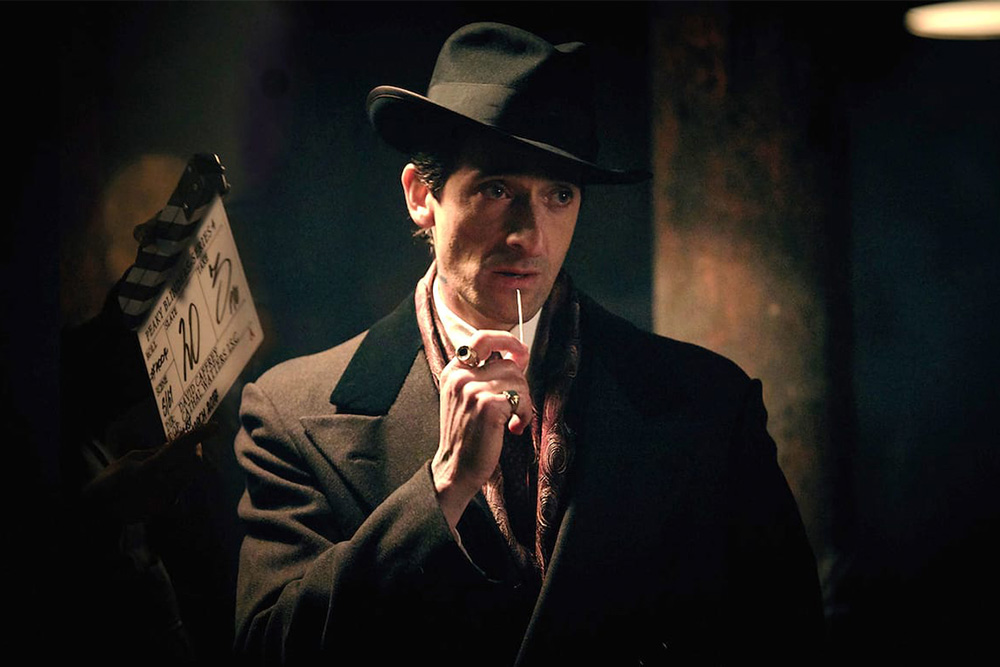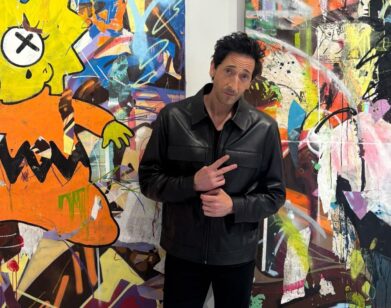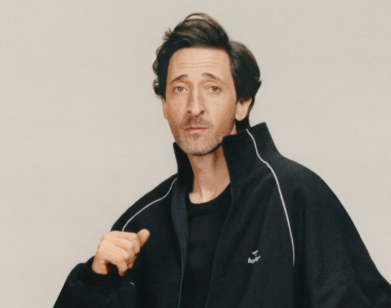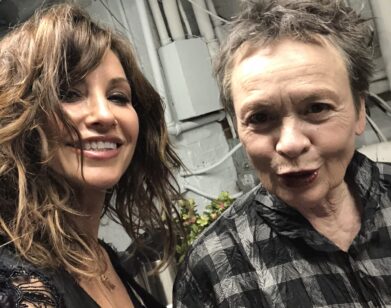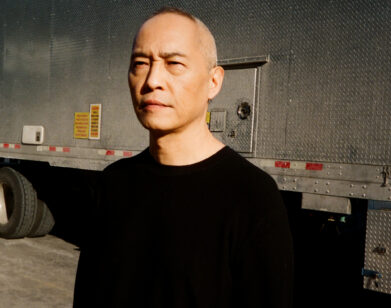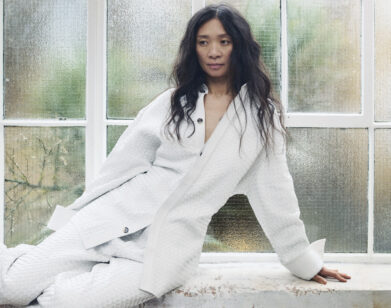The mastermind casting director behind Peaky Blinders
If you are a fan of contemporary British film and television—not the lace and pomp PBS period pieces, but those gritty, award-dominating independent dramas—you’re almost definitely a fan of Shaheen Baig. Originally from Birmingham, smack dab in the middle of England, Baig is the casting director behind all four seasons of Peaky Blinders and films like Control (2007), Lady Macbeth (2016), and God’s Own Country (2017).
She cast future stars Daniel Kaluuya and Jodie Whittaker in the first season of Charlie Brooker’s Black Mirror six years ago. She also manufactured the brilliant pairing of a rough-n-tumble Jack O’Connell with character actor Ben Mendelsohn in David Mackenzie’s brutal prison drama Starred Up (2013). This summer, she worked with Idris Elba on his debut film as a director, Yardie. “I love realistic, naturalistic filmmakers and actors,” she explains. “I’m drawn to stories that are rooted in truth.”
Before launching her own company in 2001, Baig assisted casting directors Debbie McWilliams and Jina Jay. “I was always a real anorak about film,” she reflects. “I think that’s a good place to start.”
EMMA BROWN: Since starting your own company, how have you chosen which projects you want to take on?
SHAHEEN BAIG: When you’re first starting off, you don’t have a huge amount of choice because you’re trying to get set up on your own. When I worked with Jina, we did a bunch of projects like Billy Elliott (2000) where a child was the lead, so one of the first films I did on my own was Peter Pan (2003). For the first couple of years, a lot of my projects had young people as the leads. Then it slowly changed. I made a conscious decision to say to people, “I want to do lots of different things.”
I’ve always tried not to repeat myself. It’s about the script—if it’s in script form; it might still be in a synopsis or idea form. It’s about the people involved: the director, a writer I’ve worked with before. It’s something that inspires me, something I haven’t seen before. It could be something that I think would be really difficult to cast—I quite like that. I feel like I’m educating myself all the time, so with each project I do, I learn something new. The projects that don’t quite work, I maybe haven’t gone on as much of a journey with.
BROWN: How much does personality play into casting? Do you ever have moments of, “You’re really talented, but I just don’t think you’re a very nice person”?
BAIG: [laughs] Nobody wants to be on set with somebody who is going to make it difficult— whether it’s a crew member or cast member, it’s never a fun place to be. However, in all forms of art, creative people can be complicated, and I also believe you shouldn’t hold that against them. If someone has a fantastic talent, then it’s our job to try and nurture them as best we can. If it’s somebody who is a bit complicated, it’s my job to advise the crew, the director, and say, “Look, this actor is absolutely fantastic, but you’re going to have your hands full.” Just be honest about it. Actors change and sometimes the industry can be really unforgiving. We all go through moments in our life when we mess up, and we should be allowed to try again. I feel quite strongly about that.
BROWN: How often does an actor come in and absolutely wow you?
BAIG: It doesn’t happen every day. People come in and I think, “You’re really interesting, there’s something going on that I’m excited by,” and that can happen every couple of months. That’s exciting. It could be an actor that I’ve known for ages and haven’t seen for a while. It could be an actor who is maybe at a better point in their life and they just open up and something happens. I’d say on every project, there is a moment like that with an actor.
BROWN: You hear about these really long casting searches to find the right actor. What’s one of the most challenging casting experiences that you’ve had?
BAIG: I think that most searches probably go on too long. There’s always that desire to think there’s someone around the corner, so you’ve got to keep going, when often you’ve met that person. You probably met them quite early on in the process. The films that have probably been the most challenging are both of the films I did with J.A. Bayona—The Impossible (2012) and A Monster Calls (2016). They were very difficult coming-of-age films with young boys. It’s always tricky when you’re casting young people on the cusp of adolescence, and with both films, they covered very, very tough subject matters. For The Impossible, we had to find a family of boys—a trio. It took a long time to find three boys who were different ages and believable as a family. With A Monster Calls, we only had to find one lead boy, but the journey that he had to go on in that film was huge.
BROWN: How far do you go to fight for someone you believe is the right casting choice if the director is on the fence about them?
BAIG: I’m not a shout-y person. I would never say to a director, “You’re making a mistake, you’re wrong.” All I can do is say my piece and hope that we’re in agreement. Sometimes if you push too hard, a director can reject it. They want it to be their decision. I try to give all the reasons why I believe that person is right for the job and hope that they’ve employed me for the work I’ve done in the past, and because they trust me. I hope they’ll listen, but the director has to be confident that they can get a performance from the actor.
BROWN: I want to talk about Peaky Blinders specifically. Let’s go back to the first season: how did you find the Shelby brothers? Who was the hardest role to fill?
BAIG: I think Grace was the hardest, actually. The first season was a total joy, because it was starting something from scratch. Otto Bathurst was the director on top of the first season, and we just had a lot of fun. I’m from Birmingham, so I immediately gravitated towards the script. Nothing is ever set in Birmingham. I had to sit and listen to a lot of really bad Birmingham accents to find the right people. [laughs] When we met Paul [Anderson], we were like, “Okay, he’s Arthur.” He was absolutely fantastic. Same for Joe [Cole]. We talked about lots of different people for Tommy, and just kept coming back to Cillian [Murphy]. For me, to have Cillian in a TV drama at that point [felt like] a thrill, such an honor. Getting Cillian was the most massive gift. He made Tommy hugely accessible for a male and female audience. He gave us a way into the story. With the brothers, once we had Cillian, it all made sense and took shape. All of the guys we’d seen and loved in the readings, we were like, “Now we can see it.” But Grace was trickier because we saw quite a lot of people to get someone with the right sensibility with all the lads. There are a lot of lads in Peaky.
BROWN: There are, but the women are also wonderful—Helen McCrory, obviously, and Sophie Rundle.
BAIG: Absolutely. I think as the series has gone on, the women have pushed further and further to the front, which is brilliant. We’ve got fantastic women in the show. Helen is extraordinary and gets better and better with each season. Sophie was one of the first to be cast, too. She was great from the first moment so that was an easy decision.
BROWN: It’s fun to see some high-profile actors take on supporting roles in the show. Tom Hardy is an obvious example. He always seems like he’s having so much fun with his character.
BAIG: We get a few days with Tom. He comes in a whirlwind, and leaves in a whirlwind. Those days are packed because we’ve got to get all his stuff done. It’s wonderful because suddenly you get a bigger audience tune in and it’s a real thrill. He’s a 100 percent movie star, and him and Cillian going toe-to-toe is an absolute joy. We’ve got Adrien Brody this season. A movie star will rock up and do a couple of weeks, and then off they go again. It’s fun. We feel pretty happy about that. [laughs]
BROWN: One criticism you often hear about the British film industry is that it’s still quite homogenous, especially in terms of social class. The actors who make it are the ones who train at well-established drama schools like RADA. As a casting director, do you feel a responsibility to actively try to fight that? Or is it something that you try not to think about at all?
BAIG: It’s impossible not to think about it. It’s very expensive to go to drama school, and there isn’t much provision for people who can’t afford to go in this country. We are aware of it, and we have to be aware of it. I think that’s probably got a lot to do with why street casting has become so fashionable in the last few years. You can go into communities where those kids aren’t ever going to go to drama school, it’s not even on their radar because they can’t afford it. You have to go to them. You’ve got to go and find them.
BROWN: Finally, I wanted to quickly ask you about your work on the first two seasons of Black Mirror. What an amazing cast.
BAIG: I did Black Mirror when it was for Channel Four, so up until the one-off Christmas special with Jon Hamm. It was an absolute joy. I have no idea what it’s like to be inside the brain of Charlie Brooker, but it’s probably a very brilliant place. He’s fantastically talented, and there was just a great team. We had a fantastic producer in Barney Reisz. Each script was a gem. There was never the pressure to cast stars; in a way, the script—the premise—was the star. We had huge amounts of fun. We got to cast Daniel Kaluuya, who’s absolutely brilliant in it. Look at him now—he’s taking over the world.
GOD’S OWN COUNTRY IS OUT NOW IN SELECT THEATERS. SEASONS ONE TO THREE OF PEAKY BLINDERS ARE AVAILABLE VIA NETFLIX, AND SEASON FOUR WILL AIR ON BBC TWO IN THE UK LATER THIS YEAR.

